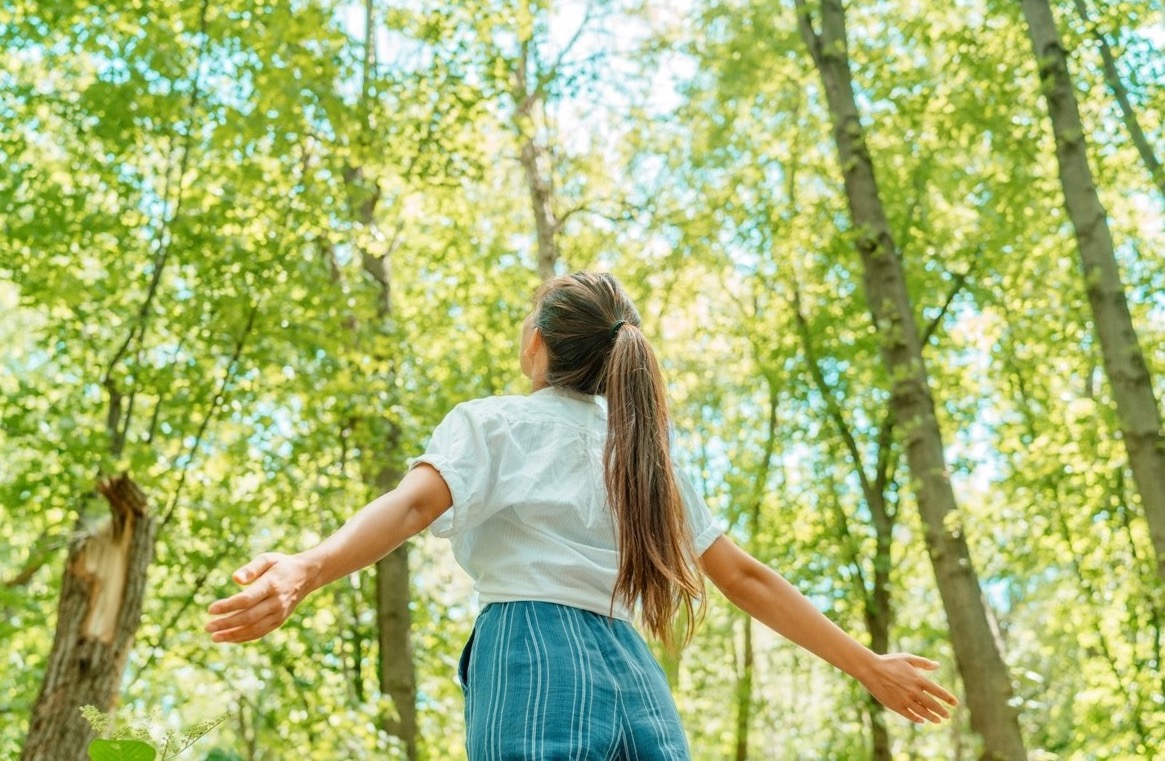By Bethany Collings, LPC, CCTP, Trauma Informed Clinician
I have been with Cornerstone since 2022 and am passionate about helping you find resiliency and hope after loss and trauma. I know how vital it is to have someone who can sit with your pain without judgment, and I strive to create a safe, warm, collaborative space for you to heal. I earned my Master's Degree in Clinical Mental Health Counseling from Cleveland State and have advanced training in trauma therapies, including EMDR. In my free time I enjoy traveling, rock climbing, kayaking, biking, and hiking with my dog.
Nature can be a gentle companion on the path towards healing, providing a sanctuary where hope can be nurtured. I learned the power of connecting with nature many years ago during one of the most difficult and painful times in my life. Amidst the challenges of my own suffering and loss, the natural world was an anchor that grounded me in the present moment and offered precious moments of calm. By being in nature, we can discover that amidst sorrow, there is always a source of peace and strength to be found.
Whether it's starting each day with a walk in a nearby park, listening to the soothing sounds of birds, gardening, sitting by the lake or a nearby creek or river, watching a sunrise or sunset, or simply taking a moment to breathe in the fresh air, these practices connect us with something larger than ourselves. For me, it was a giant sycamore tree near a creek that held me daily as I healed. Connecting with the outdoors not only offers a moment of pause but also fosters a deeper connection with ourselves. As Anne Morrow Lindbergh beautifully expressed, "I go to nature to be soothed and healed, and to have my senses put in order." This sentiment emphasizes the restorative power of nature in calming the mind and nurturing the spirit during periods of sorrow.
By intentionally seeking out these connections with the outdoors, we create opportunities to nurture our souls, process emotions, and cultivate resilience. Nature can not only encourage mindfulness and presence but also allow for the processing of grief in a gentle and supportive environment. As a certified ecotherapist, I know the profound therapeutic effects incorporating nature-based activities into one's routine during grief can provide, as research has shown that spending time in natural environments boosts your mood, lowers stress hormones and blood pressure, and improves mental health.
Below is a simple practice to begin connecting with nature to calm your mind and spirit. This practice can be as short as a few minutes or extended to fit the time you have available.
Simple Mindfulness Practice in Nature:
Find Your Space: Choose a quiet and comfortable spot outdoors where you can sit or stand comfortably. It could be in your backyard, a park, or any natural setting where you feel safe.
Breathe Deeply: Close your eyes or soften your gaze. Take a few deep breaths, inhaling through your nose and exhaling through your mouth, focusing on a slightly longer exhale. Allow your body to relax with each exhale.
Connect with Earth: Focus on the sensation of the ground beneath you. Feel the connection between you and the earth beneath you. Feel its support.
Engage Your Senses:
- Sight: Open your eyes if they were closed, and observe the details around you--the colors of the plants or flowers, the textures of the bark on the trees, the patterns in the sky.
- Sound: Listen carefully to the sounds of nature. Notice the birds singing, leaves rustling, or any distant sounds of water or wind. Allow these sounds to soothe and ground you.
- Smell: Take a deep breath and notice any scents carried by the breeze—maybe fresh grass and flowers.
- Touch: Feel the ground beneath you, the texture of the grass or dirt beneath you. If you're near water, feel its coolness or warmth.
Mindful Presence: As you continue to breathe and observe, be fully present in this moment, embracing the peace that nature offers. If you notice feelings of grief come up (and are in a space you feel safe to do so), allow them to flow through you, knowing that the earth will support you and your tears.
Gratitude: Take a moment to express gratitude for the opportunity to connect with nature and to feel grounded. Appreciate the beauty and resilience of the natural world around you.
Closing: When you're ready to finish, take a few more deep breaths. Feel the stability and strength that grounding has provided you. Carry this sense of calm and connection with you as you slowly go back to your day, knowing that you will always have this safe place to return.

No Comments.